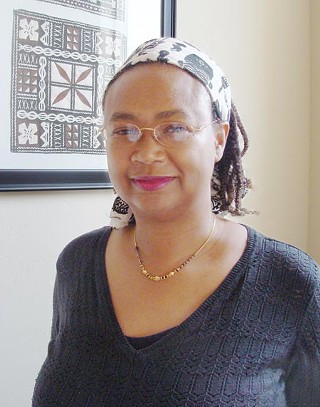Cultural anthropologist Jarita C. Holbrook left an astronomy career in the mid-'90s, and the African-American scientist recently got a chance to bring her interests together in a documentary she made with UA associate astronomy professor Romeel Davé. Hubble's Diverse Universe is about nine African-American and Hispanic astrophysicists and their work. The film, which was first screened in California, will debut in Tucson at 7:30 p.m., Monday, Feb. 8, in Room N210 of the Steward Observatory on the UA campus, 933 N. Cherry Ave.
How did the movie idea start?
Romeel had a NASA grant, and another colleague, Xiaohui Fan (had) another grant; both were tied to (the) Hubble (telescope). Whenever you get (a grant), they really want you to do something with education and public outreach. Romeel knew I had ideas on outreach and on minority astronomers—our narrative is nonexistent. Last year was the International Year of Astronomy, and we wanted to do something that could be shown during the year.
What message did you want to share?
We wanted to show faces different than the normal talking heads you see in astronomy, so we started showing them talking about their science and the kind of science that they do. The first 15 minutes ... you see a normal science show, but in different colors—all (the scientists are) Hispanic and African-Americans, male and female. The next section is on diversity and what it's like in their fields. Then they talk about mentoring and outreach, and emphasize the importance of mentoring in astronomy.
Is there a common theme that connects these scientists?
Oh, absolutely; we asked specific questions. Astronomy is actually what I studied, but because I'm no longer an astrophysicist, but a cultural astronomer, I was particularly interested in articulating things that were particular about astronomy culture and how being a minority created difficulties.
What did you discover?
One of the things that was almost across the board for the black astronomers is that they were often ... the only one in their department. There was a huge sense of isolation, and also most of the time, they were the first African American, so they had to break in all these people: "Yes, I'm African American, and yes, I'm an astronomer, and yes, I belong here, and get out of my way." It added layers and layers of stress. Of that nine, the university that graduated the most was the University of Washington in Seattle. Of the nine, three got their Ph.D.s, and one their master's ... there. It was the effort of one faculty member—one who made that much of a difference. At the same time ... there are no black faculty (members).
Did this film give you a chance to reflect on your work?
Yes, and one of the things I wanted to have in the film came from a senior scientist: a comment on racism. Astrophysics is one of the most intellectually challenging things you could study, and it was for that very reason that blacks were kept out, because they were assumed to be incapable of meeting this challenge. So success for black people in this field has an enormous impact for getting rid of racism that is inherent in both blacks and whites.
How has the documentary been received?
Astronomers absolutely love this film—which makes me concerned. It means it's too nice. Usually, they ask me how I feel about the film. I always tell them, "The best (footage) is on the cutting-room floor." But (those parts) couldn't make it in this film, because the purpose is to recruit minorities into astronomy, not scare them away.
What's next?
One of my areas of expertise is African cultural astronomy, and for years, you know, I've been waiting for people to say they want to hear about black scientists during Black History Month. ... Now it is African-American History month, and I'm booked. I'll be at MIT on the 10th, and then National Society of Black Physicists on the 13th, and then Philadelphia at a black charter school on the 17th, and then also I'm giving lectures ... at the (Joel) Valdez library on Feb. 4. ... I'm in demand, but it's taken awhile. Last year, I was interested in doing a lecture at Raytheon, but they didn't follow through. They never knocked on my door, even though my name was in the hat.





